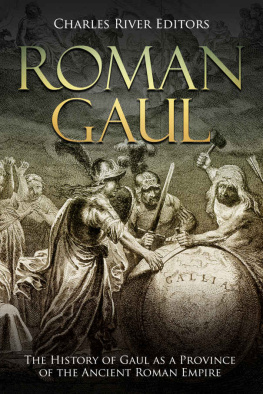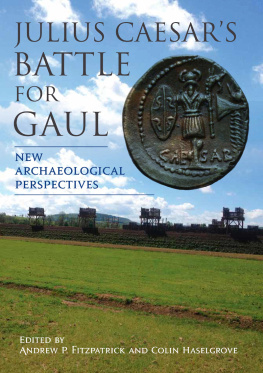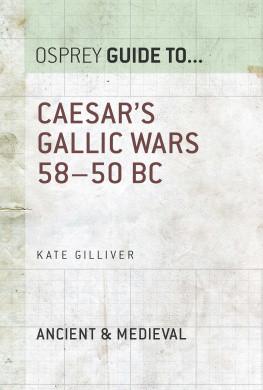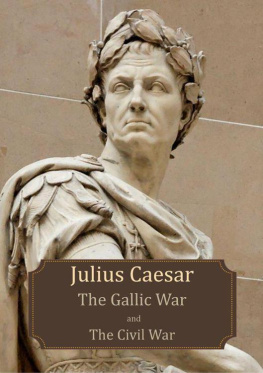Book I
Chap. I.
All Gaul is divided into three parts, one of which the Belg inhabit, the Aquitani another, those who in their own language are called Celts, in ours Gauls, the third. All these differ from each other in language, customs and laws. The river Garonne separates the Gauls from the Aquitani; the Marne and the Seine separate them from the Belg. Of all these, the Belg are the bravest, because they are farthest from the civilisation and refinement of [our] Province, and merchants least frequently resort to them and import those things which tend to effeminate the mind; and they are the nearest to the Germans, who dwell beyond the Rhine, with whom they are continually waging war; for which reason the Helvetii also surpass the rest of the Gauls in valour, as they contend with the Germans in almost daily battles, when they either repel them from their own territories, or themselves wage war on their frontiers. One part of these,
Chap. II.
Among the Helvetii, Orgetorix was by far the most distinguished and wealthy. He, when Marcus Messala and Marcus Piso miles.
Chap. III.
Induced by these considerations, and influenced by the authority of Orgetorix, they determined to provide such things as were necessary for their expeditionto buy up as great a number as possible of beasts of burden and waggonsto make their sowings as large as possible, so that on their march plenty of corn might be in storeand to establish peace and friendship with the neighbouring states. They reckoned that a term of two years would be sufficient for them to execute their designs; they fix by decree their departure for the third year. Orgetorix is chosen to complete these arrangements. He took upon himself the office of ambassador to the states: on this journey he persuades Casticus, the son of Catamantaledes (one of the Sequani, whose father had possessed the sovereignty among the people for many years, and had been styled "friend" by the senate of the Roman people), to seize upon the sovereignty in his own state, which his father had held before him, and he likewise persuades Dumnorix, an duan, the brother of Divitiacus, who at that time possessed the chief authority in the state, and was exceedingly beloved by the people, to attempt the same, and gives him his daughter in marriage. He proves to them that to accomplish their attempts was a thing very easy to be done, because he himself would obtain the government of his own state; that there was no doubt that the Helvetii were the most powerful of the whole of Gaul; he assures them that he will, with his own forces and his own army, acquire the sovereignty for them. Incited by this speech, they give a pledge and oath to one another, and hope that, when they have seized the sovereignty, they will, by means of the three most powerful and valiant nations, be enabled to obtain possession of the whole of Gaul.
Chap. IV.
When this scheme was disclosed to the Helvetii by informers, they, according to their custom, compelled Orgetorix to plead his cause in chains; it was the law that the penalty of being burned by fire should await him if condemned. On the day appointed for the pleading of his cause, Orgetorix drew together from all quarters to the court all his vassals to the number of ten thousand persons; and led together to the same place, and all his dependants and debtor-bondsmen, of whom he had a great number; by means of these he rescued himself from [the necessity of] pleading his cause. While the state, incensed at this act, was endeavouring to assert its right by arms, and the magistrates were mustering a large body of men from the country, Orgetorix died; and there is not wanting a suspicion, as the Helvetii think, of his having committed suicide.
Chap. V.
After his death, the Helvetii nevertheless attempt to do that which they had resolved on, namely, to go forth from their territories. When they thought that they were at length prepared for this undertaking, they set fire to all their towns, in number about twelveto their villages about four hundredand to the private dwellings that remained; they burn up all the corn, except what they intend to carry with them; that after destroying the hope of a return home, they might be the more ready for undergoing all dangers. They order every one to carry forth from home for himself provisions for three months, ready ground. They persuade the Rauraci, and the Tulingi, and the Latobrigi, their neighbours, to adopt the same plan, and after burning down their towns and villages, to set out with them: and they admit to their party and unite to themselves as confederates the Boii, who had dwelt on the other side of the Rhine,
Chap. VI.
There were in all two routes by which they could go forth from their countryone through the Sequani, of March], in the consulship of Lucius Piso and Aulus Gabinius [B.C. 58].
Chap. VII.
When it was reported to Csar that they were attempting to make their route through our Province, he hastens to set out from the city, and, by as great marches as he can, proceeds to Further Gaul, and arrives at Geneva. He orders the whole Province [to furnish] as great a number of soldiers as possible, as there was in all only one legion in Further Gaul: he orders the bridge at Geneva to be broken down. When the Helvetii are apprised of his arrival, they send to him, as ambassadors, the most illustrious men of their state (in which embassy Numeius and Verudoctius held the chief place), to say "that it was their intention to march through the Province without doing any harm, because they had" [according to their own representations] of April [on April 12th].
Chap. VIII.
Meanwhile, with the legion which he had with him and the soldiers who had assembled from the Province, he carries along for nineteen [Roman, not quite eighteen English] miles a wall, to the height of sixteen feet, others, by the fords of the Rhone, where the depth of the river was least, sometimes by day, but more frequently by night), but being kept at bay by the strength of our works, and by the concourse of the soldiers, and by the missiles, they desisted from this attempt.
Chap. IX.
There was left one way, [namely] through the Sequani, by which, on account of its narrowness, they could not pass without the consent of the Sequani. As they could not of themselves prevail on them, they send ambassadors to Dumnorix the duan, that through his intercession they might obtain their request from the Sequani. Dumnorix, by his popularity and liberality, had great influence among the Sequani, and was friendly to the Helvetii, because out of that state he had married the daughter of Orgetorix; and, incited by lust of sovereignty, was anxious for a revolution, and wished to have as many states as possible attached to him by his kindness towards them. He, therefore, undertakes the affair, and prevails upon the Sequani to allow the Helvetii to march through their territories, and arranges that they should give hostages to each otherthe Sequani not to obstruct the Helvetii in their marchthe Helvetii, to pass without mischief and outrage.
Chap. X.
It-is again told Csar that the Helvetii intend to march through the country of the Sequani and the dui into the territories of the Santones, which are not far distant from those boundaries of the Tolosates, which [viz. Tolosa, Toulouse] is a state in the Province. If this took place, he saw that it would be attended with great danger to the Province to have warlike men, enemies of the Roman people, bordering upon
Chap. XI.
The Helvetii had by this time led their forces over through the narrow defile and the territories of the Sequani, and had arrived at the territories of the dui, and were ravaging their lands. The dui, as they could not defend themselves and their possessions against them, send ambassadors to Csar to ask assistance, [pleading] that they had at all times so well deserved of the Roman people, that their fields ought not to have been laid wastetheir children carried off into slaverytheir towns stormed, almost within sight of our army. At the same time the Ambarri, the friends and kinsmen of the dui, apprise Csar that it was not easy for them, now that their fields had been devastated, to ward off the violence of the enemy from their towns: the Allobroges likewise, who had villages and possessions on the other side of the Rhone, betake themselves in flight to Csar and assure him that they had nothing remaining, except the soil of their land. Csar, induced by these circumstances, decides that he ought not to wait until the Helvetii, after destroying all the property of his allies, should arrive among the Santones.









